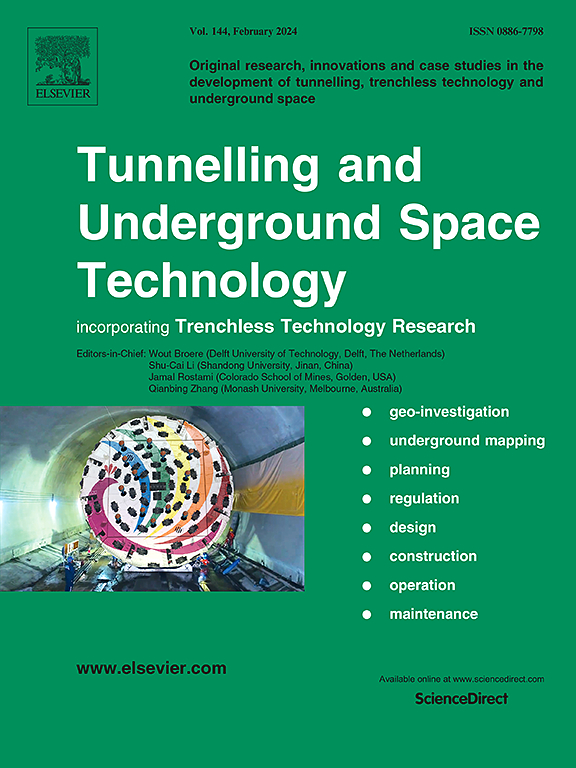基于自信学习的支持向量机,用于在噪声标签环境中进行稳健的地面分类
IF 6.7
1区 工程技术
Q1 CONSTRUCTION & BUILDING TECHNOLOGY
引用次数: 0
摘要
由于技术限制和主观干扰,野外勘探获得的地质标签可能存在误差,从而导致在为 TBM 隧道开发地机相互作用模型时出现噪声标签。本研究提出了一种新颖的基于置信学习的支持向量机(CL-SVM)来消除标签噪声,从而提高地面分类的准确性和可信度。所提出的模型优化了每个标签的置信度值,并将置信度值低的标签识别为潜在噪声。通过噪声测试证实了该模型的有效性和优越性。结果表明,CL-SVM 可接受的最大噪声比为 35%,而传统 SVM 的噪声比仅为 10%。此外,与 SVM 相比,CL-SVM 在嘈杂的标签环境中始终表现出色。通过将 CL-SVM 应用于从中国武汉地铁隧道项目中收集的类不平衡数据集,我们进一步验证了 CL-SVM。在该数据集上,受噪声干扰最严重类别的准确度指标 F1 分数从 0.7273 显著提高到 0.88。为了提高模型的实用价值,建立了一个置信度标准来评估单个预测的可信度,该标准要求可靠的预测具有高于指定阈值的置信度值。在事先不知道真实样本标签的情况下,该标准可以区分错误预测和正确预测,精确度高达 99.08%。总之,所提出的 CL-SVM 对噪声标签的鲁棒性明显优于传统模型,在隧道工程的地面感知方面显示出巨大的潜力。本文章由计算机程序翻译,如有差异,请以英文原文为准。
A confident learning-based support vector machine for robust ground classification in noisy label environments
Geological labels obtained from field exploration have potential errors due to technique limitations and subjective interference, leading to noisy labels when developing ground-machine interaction models for TBM tunneling. The present study proposes a novel confident learning-based support vector machine (CL-SVM) to eliminate label noise, thereby improving the accuracy and credibility of ground classification. The proposed model optimizes confidence values for each label and recognizes those with low confidence values as potential noise. Its effectiveness and superiority are confirmed through a noise test. The results indicate that the maximum acceptable noise ratio of the CL-SVM is 35%, while that of the conventional SVM is only 10%. In addition, the CL-SVM consistently emerges as a superior performer compared to the SVM in noisy label environments. The CL-SVM is further verified through its application on a class-imbalanced dataset collected from a metro tunnel project in Wuhan, China. Here, the accuracy metric F1-score for the most noise-interfered class is significantly improved from 0.7273 to 0.88. To enhance the model’s practical value, a confidence criterion is established to evaluate the credibility of individual predictions, which requires reliable predictions to have higher confidence values than specified thresholds. Without prior knowledge of true sample labels, this criterion distinguishes mispredictions from correct predictions with a remarkable precision of 99.08%. In summary, the proposed CL-SVM exhibits significantly better robustness to noisy labels than conventional models, demonstrating great potential for ground perception in tunnel projects.
求助全文
通过发布文献求助,成功后即可免费获取论文全文。
去求助
来源期刊

Tunnelling and Underground Space Technology
工程技术-工程:土木
CiteScore
11.90
自引率
18.80%
发文量
454
审稿时长
10.8 months
期刊介绍:
Tunnelling and Underground Space Technology is an international journal which publishes authoritative articles encompassing the development of innovative uses of underground space and the results of high quality research into improved, more cost-effective techniques for the planning, geo-investigation, design, construction, operation and maintenance of underground and earth-sheltered structures. The journal provides an effective vehicle for the improved worldwide exchange of information on developments in underground technology - and the experience gained from its use - and is strongly committed to publishing papers on the interdisciplinary aspects of creating, planning, and regulating underground space.
 求助内容:
求助内容: 应助结果提醒方式:
应助结果提醒方式:


